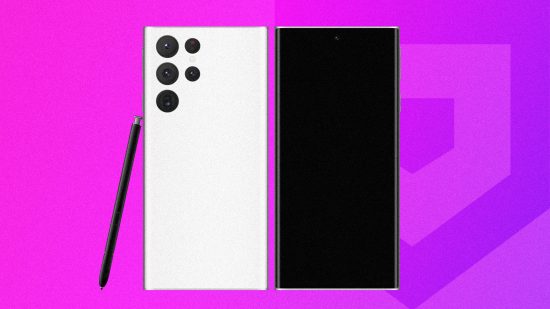The best 5G phones can access the 5th generation of mobile cellular technology, which brings extra speed and capacity for streaming, gaming, and browsing on the go. 5G turned up just a few years ago, and while everyone said we wouldn’t see benefits for a very long time it’s inevitable that 5G can bring lightning-hot speeds to all the best 5G phones out there. The best cell phone providers already have great data plans for 5G phones, but which is right for you?
At Pocket Tactics, we spend hours testing the best 5G smartphones for mobile mavens, camera connoisseurs, and gamers. We use phones daily, review them often, and have a full view of the smartphone landscape.
Whether it’s the high-end luxury of Apple and Samsung’s offerings or the budget brilliance of little-known brands like Tecno and OnePlus, there’s so much available. If you’re specifically looking for a handset to play the best mobile games, check out the best gaming phones.
Here are the best 5G phones in 2023:
- Samsung Galaxy S23 Ultra – best 5G phone
- iPhone 14 Pro – best 5G iPhone
- Xiaomi 13 Pro – alternative 5G smartphone
- Asus ROG Phone 7 – best 5G phone for gaming
- OnePlus Nord 2 – best budget 5G smartphone
- Samsung A54 5G – best mid-range 5G smartphone
1. Samsung Galaxy S23 Ultra
The best 5G smartphone overall.
| Samsung Galaxy S23 Ultra specs | |
| Chipset | Snapdragon 8 Gen 2 (made for Galaxy) |
| Display | 6.8-inch 120Hz AMOLED (1440 x 3088 pixel) |
| Storage | 256GB to 1TB |
| RAM | 8GB to 12GB |
| Battery | Li-Ion 5000 mAh |
Pros:
- Industry-leading cameras
- Excellent performance
- Beautifully well-rounded package
Cons:
- Pricey
- Strong competition
The best 5G smartphone you can buy today is the Samsung Galaxy S23 Ultra, which also makes it the best phone on the market today, at least in our books. Industry-leading performance and cameras, combined with a gorgeous display and slick operating system make it pretty unbeatable.
The main selling point here is the cameras, something only the Xiaomi 13 Pro can compete with. Clean shots, good back-end processing, and excellent zoom mean that this is the best way to get good snaps on the go.
Then there’s the performance. Thanks to the unique Snapdragon chip in the S23 line of Galaxy phones, the gaming performance is near-unbeatable. They’re even capable of ray tracing, amazingly, something you can learn more about in our Samsung’s Won-joon Choi interview.
Beyond that, the Galaxy S23 Ultra is just a well-rounded, premium package. The build quality is excellent, the operating system is as good as it gets on Android, and the display is gorgeous. Combine this with solid battery life and the included stylus, and it’s hard to beat.
The only downsides come down to personal preference. You may prefer the design of another phone like the Xiaomi 13 Pro. You might prefer using an Apple device. But if not, this is the best way to go for a premium 5G smartphone.
2. iPhone 14 Pro
The best 5G iPhone.
| iPhone 14 Pro/Pro Max specs | |
| Chipset | Apple A16 Bionic |
| Display | 6.1/6.7-inch 120Hz OLED (1179 x 2556 / 1290 x 2796) |
| Storage | 128GB to 1TB |
| RAM | 6GB |
| Battery | Li-Ion 3200/4323 mAh |
Pros:
- Excellent design
- Apple ecosystem
- Near-perfect package
Cons:
- Expensive
- OS bugs
- Strong competition
The iPhone 14 Pro and Pro Max are the best 5G iPhones available today. With two size options, a high-refresh-rate screen, a dynamic island, ace cameras, and excellent performance, they’re the best Apple offers at the time of writing.
The main reason to dive in here is because it’s Apple. The integration of iOS with various accounts and other devices you may own is exceptional – no one does an ecosystem like Apple. If you have a Mac, iPad, Apple TV, AirPods, or HomePod, it’d be a bit odd to not own an iPhone.
What the hardware itself offers is also pretty exceptional. There’s a great set of cameras for taking snaps, and Apple’s photo processing is rock solid. Meanwhile, the battery life is decent (if you turn off the always-on display), and the display is a real step up versus previous generations.
Perhaps the biggest draw is the A16 within, giving you excellent power for all your gaming needs, making it the best gaming iPhone, easily. Combine this will all the Apple Arcade games out there and you’re flying.
The only issue here is also the main benefit: it’s Apple. If you don’t like iOS or want various compatibility and ease-of-use benefits, you might not want to go this way. You don’t want to end up with a Samsung Galaxy Watch, Google Pixel Buds, and an iPhone, after all.
3. Xiaomi 13 Pro
The best 5G phone for anyone not happy with the two above.
| Xiaomi 13 Pro specs | |
| Chipset | Snapdragon 8 Gen 2 |
| Display | 6.73-inch 120Hz AMOLED (1440 x 3200) |
| Storage | 128GB to 512GB |
| RAM | 8GB to 12GB |
| Battery | Li-Po 4820 mAh |
Pros:
- Luxurious design
- Excellent cameras
- High performance
Cons:
- Big, cumbersome design
- OS bugs
The Xiaomi 13 Pro is an excellent competitor against the two biggest flagships in the market. If you don’t want Samsung or Apple, this is probably the best alternative 5G smartphone you can go for.
As always, these phones compete on the same things. The Xiaomi 13 Pro’s screen is excellent, it has really impressive battery life and fast charging, some of the best cameras we’ve seen on a smartphone, and the latest chip from Qualcomm. Sounds like all the other flagships out there, right?
Well, the big difference is design. The Xiaomi 13 Pro is a gorgeous slab of glass, with curved edges, a gargantuan camera bump, and an overall luxurious feel. It’s big, it’s bold, and it’s lovely. But it’s also a tad slippery.
Beyond design, there’s not much else that sets the phone apart. It performs admirably against the competitors in every single category bar one. And that one category is the operating system.
While you may not notice over a week, a year spent using the Xiaomi 13 Pro may highlight some operating system hiccups that will begin to irritate. Whether it’s the home screen stuttering or hard-to-find settings options, it’s still a bit fresh. It’s also improved loads over the years, so hopefully that won’t be the case forever.
Read our Xiaomi 13 Pro review.
4. Asus ROG Phone 7
The best 5G phone for gaming.
| Asus ROG Phone 7 specs | |
| Chipset | Snapdragon 8 Gen 2 |
| Display | 6.78-inch 165Hz AMOLED (1080 x 2448) |
| Storage | 256/512GB |
| RAM | 12/16GB |
| Battery | Li-Po 6000 mAh |
Pros:
- Best display on the market today
- Astonishing speakers
- Industry-leading gaming performance
Cons:
- Large, gamer-focused design
- Dust/water resistance
- Expensive
The ROG Phone 7 is easily the best gaming phone on the market, and, as it has 5G, that makes it the best 5G smartphone for gaming. While it has clear gaming benefits, it’s also a great all-rounder and even beats the big boys on some metrics.
Let’s start with the obvious, though. The Asus ROG Phone 7 has the latest Qualcomm chip combined with an excellent heatsink and gaming-first ergonomics, meaning it’s unbeatable for all your mobile gaming needs. Long sessions in the most demanding games barely phase the thing, and it’s ace.
But it’s not a one-trick pony. The display is probably the best display you can get on a smartphone today – it’s truly astonishing to look at. The speakers create the best soundscape I’ve heard on a handset. And the battery is massive. It’s such a good phone.
So, it sounds like this is the best phone in the world, right? Well, not quite. While it has lots of good aspects, its gaming-first mindset does mean that some things suffer. The design is plastic and plastered with a design that screams “gamer”.
Plus, the screen has a big chin and forehead, the two charging ports limit its dust and water resistance, and the overall size of the thing is a tad hefty. It’s definitely a gaming phone and an exceptional one at that, but it’s not quite as slick as other flagships.
Read our Asus ROG Phone 7 Ultimate review.
5. OnePlus Nord 2
The best 5G smartphone for small budgets.
| OnePlus Nord 2 specs | |
| Chipset | MediaTek Dimensity 1200 |
| Display | 6.43-inch 90Hz AMOLED (1080 x 2400) |
| Storage | 128/256GB |
| RAM | 6/8/12GB |
| Battery | Li-Po 4500 mAh |
Pros:
- Great value
- Nice display
- Good performance
Cons:
- No wireless charging
- Not waterproof
The OnePlus Nord 2 is an excellent all-round budget mid-ranger, and probably the best 5G phone for anyone out there on a budget. It has a tremendous 90Hz display, decent performance for the price, and it’s the sort of handset where most people won’t notice the cost-saving measures.
First off, performance. If you’re a gaming obsessive, you may notice some hitches, but the MediaTek Dimensity 1200 is mighty powerful. It can fly through day-to-day tasks with ease and game on the go without too much trouble in most cases. It’s ace.
Then there’s the lovely AMOLED screen, which at 90Hz may sound disappointing, but is good enough at this price range. Add to this a decent camera for snapping shots, alongside OnePlus’ ever-ace fast-charging, and it starts to feel close to a flagship.
The cost-saving comes in quite simple things, however. There’s no dust or water resistance rating, meaning a quick plunge in the bath could spell the end. Meanwhile, it doesn’t offer wireless charging, but that’s unlikely to matter to most people. Overall, it’s an excellently well-rounded handset, and its 5G capability is just an added bonus.
6. Samsung Galaxy A54 5G
The best mid-range 5G phone.
| Samsung Galaxy A54 5G specs | |
| Display | 120Hz 6.4-inch AMOLED (1080 x 2340) |
| Battery | Li-Po 5000 mAh |
| Chipset | Exynos 1380 |
| RAM | 6GB-8GB |
| Storage | 128GB-256GB |
Pros:
- High-refresh-rate screen
- Good battery life
- Samsung reliability
Cons:
- More expensive than the competition
- Sightly barebones design
The Samsung Galaxy A54 5G is a great mid-range option for anyone after a 5G phone. Even if you’re on a tighter budget, it’s worth shopping around for deals on this handset – it has many flagship features without the high price.
With a 120Hz display, lovely build quality, and a shared design language with the big boys in the bunch, it definitely feels like a premium product. The battery is nice and big, the main camera is pretty ace for the price, and all around, for day-to-day tasks, this is more than enough.
Still, there are of course drawbacks to buying a phone at a third of the cost of a flagship. The chip inside is nowhere near the Snapdragon 8 Gen 2 if you really want to push your phone – the A54 is enough for standard stuff, but don’t expect to max out the graphical settings or do some in-depth photo editing.
That’s the main drawback, mind you. The camera is good enough – nowhere near the low-light or zoom performance of the S23 Ultra, however – while the trusted Samsung software support is a boon against some of the smaller-scale competition. It’s a great deal.
How do I choose the best 5G smartphone for me?
The best 5G phone for you comes down to many aspects. If you don’t have $1,000 to spend, that cuts out almost all the flagships. Don’t sweat though, as the mid-range and budget options on this list are excellent.
Beyond price, you need to look at features. If you’re a camera obsessive, the Samsung Galaxy lineup is well known for its photography features. If you really need gaming performance, the Asus ROG Phone 7 is the ultimate choice. If you just want an all-rounder without spending much money, the OnePlus Nord likely has you covered.
For more beyond the best 5G phones on the market today, check out our guides to the best Samsung phones, best rugged smartphones, and best iPad to pick out even more tech titans.


















